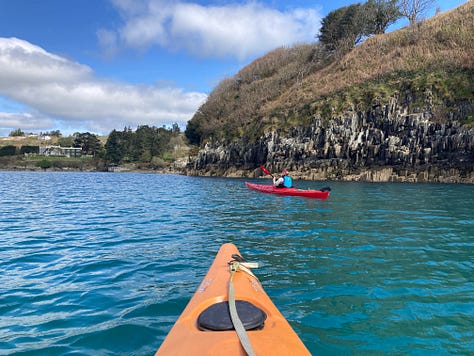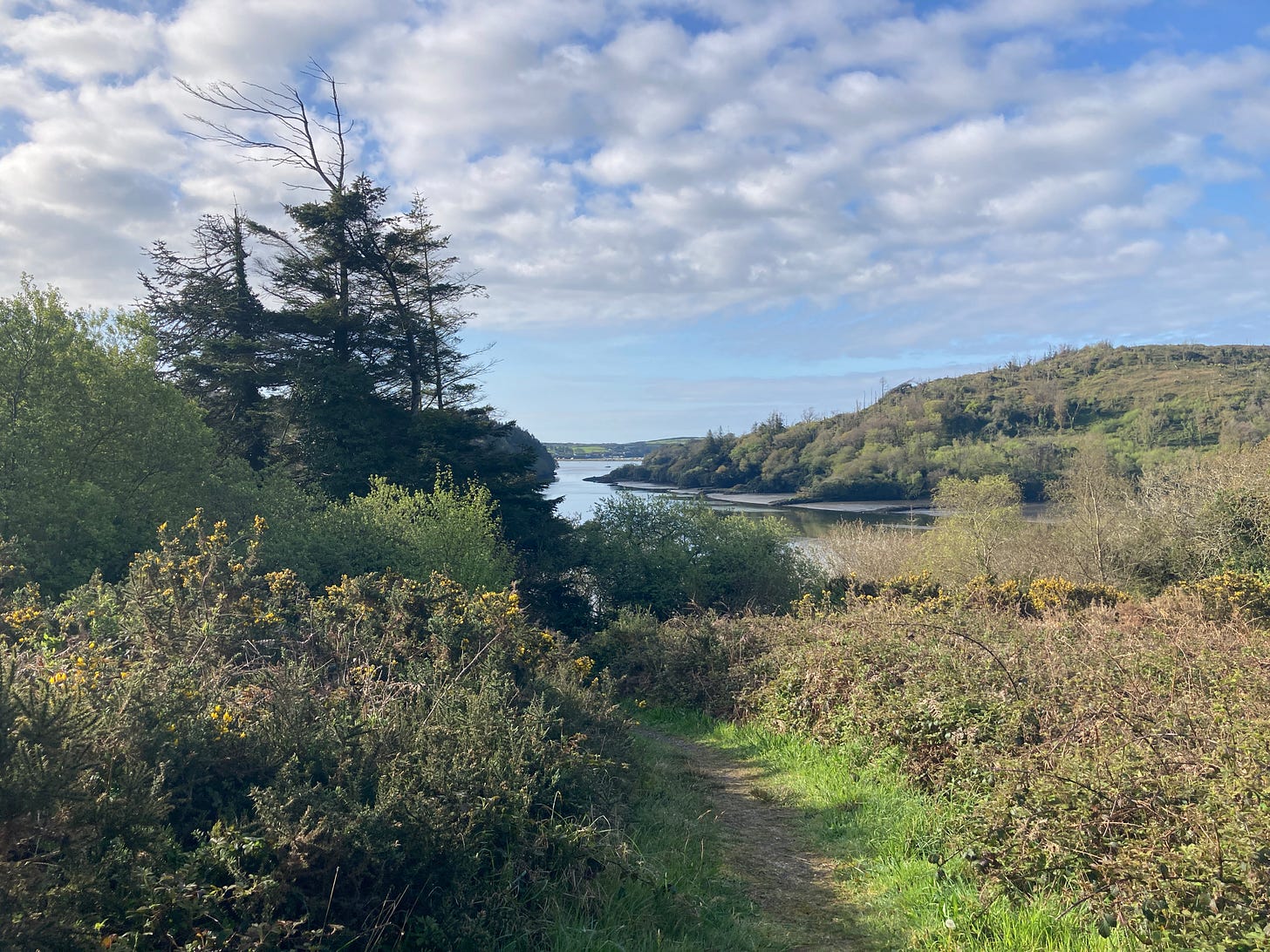Mixed with the usual April rain and chill we’ve had some stretches of South Of France weather here in West Cork. It’s been a welcome hint of the warmer weather that lies ahead, and prompted a general scramble into sea kayaks to take advantage. In contrast to the deck of a cruising sailboat, a kayak puts you almost into the sea. It’s a different sort of spray-soaked immersion, and everything is up close: birds wheeling and diving for fish, wavelets and wind ripples, skeins of weed drifting past, jumbles of stone on the bottom. The net effect is similar, though. You tune into your surroundings and feel Wendell Berry’s “peace of wild things” settle over you. That is the particular sort of peace that deepens my breath and opens my mind. In the moments when I find it, as Berry put it, I “rest in the grace of the world, and am free.”
I think a lot about how to try and return that grace, by putting less pressure on the wild things and wild places. But it’s surprising how hard it is when starting from within the mainstream of modern culture. My boat-based experiment in simpler, lighter living has made some progress. Being a carless vegan on a sailboat (I am not alone!) has reduced my annual carbon footprint to about 6 tons of carbon equivalent (CO2e). Well, if I don’t include flying. If I add in the flying I do (especially here to Ireland), my footprint basically doubles. A carless vegan on a sailboat who also flies, it turns out, isn’t really gaining much ground. There is no way around the physics of it. Air travel is brutally carbon intensive, and one round trip flight to Cork from Washington DC puts about twice as much carbon into the atmosphere as an entire year of plant-based eating.
At least I’ve identified the fatal flaw in my carbon reduction aspirations, which helps concentrate the mind. Plus, I’m not quite ready to give myself a failing grade. Twelve tons of CO2e is still less than the average American (15 tons CO2e), and way less than wealthy Americans (56 tons CO2e). That is some comfort, but you can always find someone with a bigger footprint.
Flying thirty-eight thousand miles in a private jet is like flying 380,000 miles in a commercial plane, so Taylor is making me look good. But relativism is a fast path to a failing planet. In any case, my experiment is about trying to create a life that is in harmony with the planet, and not at war with it. So there is no way around the fact that I will have to deal with the flying if I want to achieve grace.
The journey is perhaps more arduous than I anticipated. Even if I get down to 6 tons of CO2e or less, the Intergovernmental Panel On Climate Change (IPCC) has calculated that in order to have a chance at just 1.5 degrees C of warming annual per capita emissions have to average…around 1.5 tons of CO2e between now and 2050. That is a pretty stunning number, which reflects how out of synch western lifestyles are with climate reality. Yes, you can start with more and phase out. Yes, the evolution of technology will help. Yes, billions of people in the poorer parts of the world average well under that (the annual carbon footprint of an Ethiopian, for example, is just .56 tons), providing a cushion for wealthier humans to keep burning more than their fair share of carbon. But if you believe in fairness and don’t want to be a climate hog, there is some radical re-invention required.
So for the moment I am an overmatched Quixote, continuing to ride unsteadily forward. The one silver bullet (lance?) that I like to think buys me a little time is the plausibly legitimate carbon credits I have been earning by moving almost all my banking in recent years to Atmos (which uses its FDIC-protected deposits to loan money for solar buildouts). Almost all the big banks, in pursuit of short-term profit, seem determined to fuel the climate crisis with loans that allow the oil and gas sectors to keep building the infrastructure that is cooking the planet (Citibank, the bank I ditched, is one of the worst).
One of the simplest things anyone with a bank account can do is not participate in that self-destructive financing. Thanks to Atmos I have accumulated more than 56 tons of CO2e carbon credits, and talked the rest of my family into making the switch (can I claim additional, indirect, credits?). Technically, that makes my lifestyle carbon positive at the moment, but it feels a bit like cheating. I’ll take any carbon credits I can get but there is no substitute for actually doing what I set out to do, which is to eliminate my carbon emissions by 2030. (If you want to check Atmos out, go here.)
My plan for the next year and a half should help. Most important, I intend to sail Laughing Gull across the Atlantic to Ireland during the summer of 2025, which will drastically reduce my need to fly anywhere. I’ll also keep adding solar panels wherever I can on LG (having doubled the solar capacity already), because watching the sun pour amps into my batteries is like watching magic, and notably reduces my consumption of diesel. I’ll keep trying to sail more and motor less. As usual, I will do my best to stay out of cars and on my bike or my own two feet for local travel.
Lots of people view this sort of reinvention as requiring “sacrifice.” They want to eat meat and dairy, they want to fly where they like, they want to drive for convenience, and buy all the stuff they think (or maybe they are told) they need. I don’t think that is quite right. Our times, and the existential dangers that define them, require radical change. But change can be exhilarating. Reinvention can mean renewal. When sunrise and sunset become spectacles, when dolphins play at the bow, when you have time to read, think and reflect, when you can find new communities of shared passions, when you feel you have become part of a vast natural, living web, you have moved into a fascinating, meaningful, and joyous, world. Not to mention morally defensible. Finding my way there has been anything but a sacrifice.





Not everyone can, or would want to, move onto a sailboat, of course. Not everyone is old enough to semi-retire (or rewire, as I like to spin). But that is only my chosen path. Simplicity and connection with the natural world are the themes that matter. Anyone can transition to a plant-based diet (it can be delicious, I promise). Anyone can live with less stuff. Anyone can ride a bike and walk more, and drive less, to get around the neighborhood. Anyone can explore the nature nearby rather than flying off to check something off on a bucket list. Simplicity and connection can work in an infinite number of contexts, and at any stage of life. (Here’s a fantastic website that provides a roadmap to reducing your carbon footprint). To circle back to Wendell Berry, the peace of wild things, freedom, and the grace of the world, are there for anyone who chooses to seek them out. And as more and more of us do, the arc of our planet will bend toward harmony.

In Memoriam: This week, Don Street, an icon of the cruising world and a fixture in the village of Glandore, passed away peacefully. Don was 93, and up until the very end he was active and preparing his 91-year old wooden dragon, called Gypsy, for the upcoming racing season.
I have enormous affection for Don, and he has an association with my family that goes back more than 60 years. He never sailed on the original Laughing Gull (as far as I know). But he spent many days sailing Antilles, the 46-foot S&S ketch which succeeded Laughing Gull, back and forth to the Caribbean. And he often emailed me about my current adventures in Laughing Gull, offering advice on…just about everything.
Here, for example, is one email he sent me last year, which is classic Don. It contains his firm view about the best strategy for getting to the Caribbean from my part of the Atlantic coast (his advice was ALWAYS firm). It contains a good sea story, and some humor. And it contains much (slightly) garbled language, a feature of all Don’s written communication (I leave the email mostly unedited so you get the flavor):
Going south I strongly advise NOT departing mouth the Chesapeake, rather In early October go south inside the GS leave the boat in Beaufort In the marina fully stocked and ready to depart. Then watch the weather, contact one of the good weather routers. and when it looks good, Skipper and crew hotfooted to Beaufort take off from Beaufort.
You are 110 miles south of the mouth of the Chesapeake, at the bottom edge of frequent gale warnings. Take off on a Northwest, your across the GS in less than a day ,then ESE until the butter melts then head south
In 1961 we took off on Antilles, did 920 miles in five days. I told the crew to write that down in their logbooks as they would never do that many miles again on a boat about Antilles size.
The next year 62 we took off on the same conditions and did 980 miles in five days . hen the wind went absolutely flat. Repowered within 40 miles of St. Thomas then shut the engine down to give us a few minutes engine time to get [into] St. Thomas however
We were in AM radio contact with St. Thomas, Viv snow the skipper contacted the St. Thomas Carter boat office and ask them to notify [your grandfather] by a telegram that all was well but we were becalmed and no fuel
Three of us were on per diem wages. I tried to get Viv to Ask the charter office to send the following Telegram
We are out of wind, we are out of fuel, you are out of pocket
Viv was not sure of [your grandfather’s] sense of humor so would not send the above telegram
May Don be sailing in peace, in a classic wooden yacht, wherever he is. I can assure him my grandfather would have been amused, had the telegraph been sent. And that I will miss getting lots of unsolicited (and wise) directives about all my sailing endeavors. And drinking warm Heinekens from the bilge of Gypsy after the end of a race.
They don’t make them like Don anymore.
If you liked this post from Sailing Into The Anthropocene, why not subscribe here (free!), and/or hit that share button below? You can also find me on Instagram and Twitter.








Enjoyed your self-questioning Tim! You would enjoy my new book "Salt Horse" which came out end-April. It's the memoir of a maverick admiral who lived half or more of his life afloat 1877-1963. Another world, of course. We only fly once a year now but it is London-Cape Town return (to our 5-week timeshare in CT in Feb-March). After moe than 35 years travelling the world for a living, I suppose I will die heavily in debt re my carbon footprint. Can't really be avoided now (I'm 81 next month). Jeff Trimble told me about your freelancing and sub-stacking. Good luck!
Hey Tim, do you ever consider partaking of the plentiful fruits of the ocean that you travel upon? Just curious. Nice reasoning and writing! Thanks.